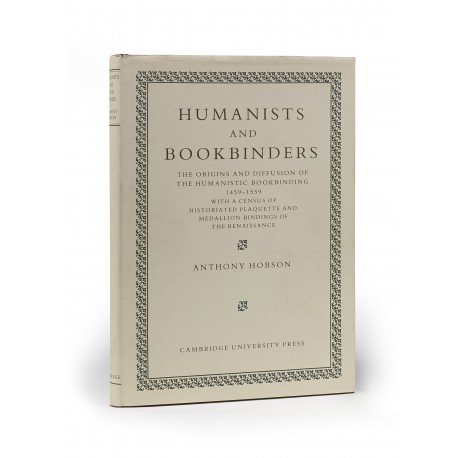 View larger
View larger
Humanists and bookbinders : the origins and diffusion of the humanistic bookbinding, 1459-1559, with a census of historiated plaquette and medallion bindings of the Renaissance
Cambridge, Cambridge University Press, 1989
(30.5 cm), xix, 296 pp., 5 colour plates, 198 black & white illustrations. Publisher’s cloth, printed dust jacket. - A revision of a series of lectures delivered at the Pierpont Morgan Library in 1979. In the first part, Hobson challenges E.P. Goldschmidt’s theory that the Islamic invention of gold-tooling was introduced to Europe through Naples, drawing attention to the practice of gold-tooling at Florence in the first decade of the Quattrocento, and to seven Paduan bindings of the 1460s and 1470s. Once established in Padua and Venice, gold-tooled bindings became the preferred cover for humanist books acquired by collectors all over Europe. In the next part, Hobson is concerned with various groups of bindings featuring classical ornament, including a group of thirteen decorated with aedicules, and others incorporating images taken from medallions and plaquettes, and with the spread of these bindings outside of Italy. The concluding part is on the bindings of the Fontainebleau library, and its creative genius, Gommar Estienne, appointed binder to the king in 1550. Analytical review by Jan Storm van Leeuwen, in Quaerendo 23 (1993), pp.44-51. ¶ Excellent, unmarked copy.
Books sent to some EU destinations are experiencing customs delays
- Subjects
- Bookbinding
- Bookbindings, Medallion or plaquette
- Authors/Creators
- Hobson, Anthony R.A., 1921-2014
- ISBN
- 0521355362
- 9780521355360
Top


